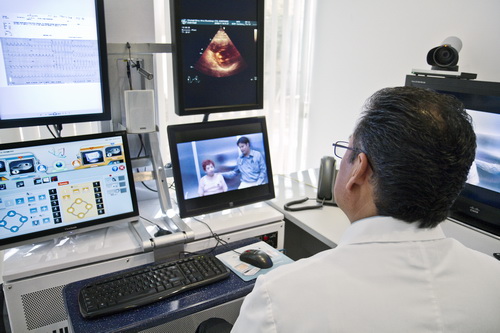 You are what you eat. If you eat healthily, get adequate sleep and exercise regularly, chances are you will stay healthy. But part of staying healthy also requires you to visit a doctor. Be it a routine checkup or an emergency, visiting a physician’s office is inevitable. For many people and not a wise choice to do, they don’t visit a doctor until there is an emergency or a serious medical condition that materializes.
You are what you eat. If you eat healthily, get adequate sleep and exercise regularly, chances are you will stay healthy. But part of staying healthy also requires you to visit a doctor. Be it a routine checkup or an emergency, visiting a physician’s office is inevitable. For many people and not a wise choice to do, they don’t visit a doctor until there is an emergency or a serious medical condition that materializes.
In this era of technology, Google can help you find just about anything. Medical treatments are no exception. If you are sick, you might want to check your symptoms online and find out the cure, similar to what you are probably doing with this article.
A person once posted a meme on Facebook that said: “If you found it on the Internet, you know it is true!”. Well, that is obviously a sarcastic talking point, especially in today’s social environment, so is getting information online the right approach? How do we distinguish between correct and incorrect data? Will access to medical information online completely replace the need to visit a doctor in the near future? Let’s take a look.
Online Medical Information Saves Time
 One of the most sacred resources of our generation is time. You never have enough of it. If you are a working individual or a stay at home parent, your daily routine is packed with tasks. In case you are sick, access to online medical information can help you save time and money.
One of the most sacred resources of our generation is time. You never have enough of it. If you are a working individual or a stay at home parent, your daily routine is packed with tasks. In case you are sick, access to online medical information can help you save time and money.
It is a benefit not only in scheduling an appointment and commuting to the doctor’s office, but it will also save time in the waiting room.
If you access the right information online, it will help you save money as well. It will allow you to proceed with your day as planned rather than rescheduling it for the doctor’s visit. So if you have the right information from a credible source, you can move on with your day at work or school.
Getting the right medical information online will also help you avoid any unpleasant experiences with your insurance company when scheduling an appointment with your doctor. Since you don’t have to pay anything, you don’t have to worry about informing your insurance company or paying out of our pockets, so as far as time is concerned, it’s a winner here.
The Credibility of Medical Information
 Now to a more significant factor. How true is what you are reading?
Now to a more significant factor. How true is what you are reading?
Before you use the medical information available, check the source of information. Always review who is providing or endorsing the content. Blogs, news articles, and website material are generally published for information sharing and might not be backed with research.
Also, check the reviews and read the “About Us” page. How long have they been in business? Are they located in the US? What doctors are on staff?
Some companies provide biased recommendations about certain medicines and treatments, so be careful. The effectiveness of prescribed treatments depends on a number of factors. So when referring to online content, do thorough research before you go with medical advice.
If you are using a credible source, such as John Hopkins Medical Library, WebMD or the Mayo Clinic, you know you are reading reliable material, so make sure your sources are from a credible source by following the suggestions above.
Chances of Incorrect Diagnosis and Treatment
 If you follow the conventional pattern of visiting a doctor and using the prescribed medicine, you can refer to the doctor in case of an incorrect diagnosis or side effect of a certain drug. But you lose this edge if you are only relying on online medical information.
If you follow the conventional pattern of visiting a doctor and using the prescribed medicine, you can refer to the doctor in case of an incorrect diagnosis or side effect of a certain drug. But you lose this edge if you are only relying on online medical information.
Self-medication is dangerous, but an incorrect diagnosis is worse. That too if you are doing it yourself. Since you are not a trained medical professional and Google is not a doctor, there is always a chance that you might end up with the wrong diagnosis. Not because the information available online is wrong but because it might not be right for you.
Check the relevance and date of the information available online. Data on the internet is limitless but only a very small percentage may be relevant for you. Make sure you only refer to information that can help you.
Online Medical Information Does Not Take into Account a Patient’s Medical History.
If you are visiting a doctor’s office or if you are telecommuting (a more appropriate approach) with a doctor, he/she is likely to take all your medical history into account before suggesting a treatment for your problem. This process ensures that the current medication does not interfere with any other medicines which you are already using. It also ensures that the current treatment does not aggravate or trigger any other previous medical condition.
If you are referring to online medical information for the treatment, Google will ignore your medical history and an online treatment will ignore the reaction of new drugs with the ones you are already using; however, it might give warnings about mixing a subject medication with ones that you already have. With that said, these warnings only scratch the surface and when you are dealing with drugs, scratching the surface is not good enough. You must be vigilant of this!
A patient’s medical history also includes a list of allergies and drug chemicals which might trigger or worsen them. This information might also be available online, but since you are not a trained professional, the chances are that you might simply overlook these facts. This small mistake can be a serious hazard to your health. Drug reactions and allergies can even be fatal.
Conclusion
 Access to online medical information comes with its own set of advantages and disadvantages. If you are getting information from a credible source, it is highly likely that you get the right medical information. Effective treatments for certain medical conditions like fever and flu can be easily accessed online but you still should see a doctor and for emergency conditions like burns or fractures, you must see a doctor. It is easier to identify more serious medical conditions like chronic kidney disease or cancer, but you have to see a doctor for the right treatment.
Access to online medical information comes with its own set of advantages and disadvantages. If you are getting information from a credible source, it is highly likely that you get the right medical information. Effective treatments for certain medical conditions like fever and flu can be easily accessed online but you still should see a doctor and for emergency conditions like burns or fractures, you must see a doctor. It is easier to identify more serious medical conditions like chronic kidney disease or cancer, but you have to see a doctor for the right treatment.
With advancements in technology and access to information, your visits to the doctor are likely to decrease in the near future. But humans are social animals, and sick people always need emotional support. The social needs of a human being cannot be met by the internet. The human element in treating patients will always survive regardless of access to information.

